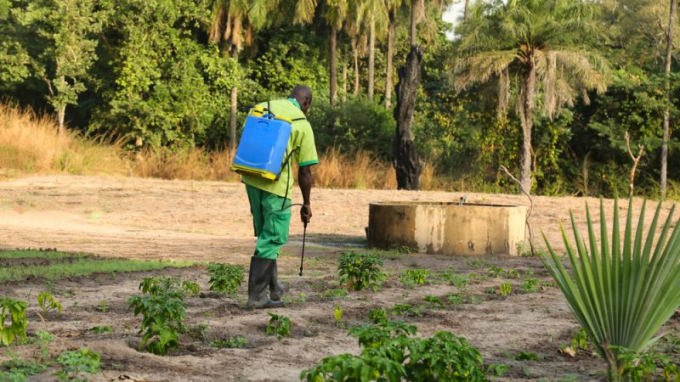May 22, 2025 | 04:28 GMT +7
May 22, 2025 | 04:28 GMT +7
Hotline: 0913.378.918
May 22, 2025 | 04:28 GMT +7
Hotline: 0913.378.918

The Commission has started the procedure to reduce maximum residue levels (MRLs) for clothianidin and thiamethoxam to the limit of quantification, meaning to technical zero. Photo: Shutterstock
Although hailed by part of the European civil society, the EU’s tight line on import tolerances for pesticide substances can cause a lot of headaches for African food producers, who fear being excluded from the single market and left with no alternatives to protect their crops.
Under its flagship food policy, the Farm to Fork Strategy, the EU has committed to taking into account environmental aspects when assessing requests for import tolerances for pesticide substances no longer approved in the bloc, while respecting WTO standards and obligations.
Therefore, the Commission’s priority will be given to environmental issues of global concern that go beyond national boundaries.
As explained by a Commission official, this means in practice that the same EU legislation setting maximum residue levels – including also import tolerances – applies to all food whether domestically produced or imported regardless of the country of origin of the food.
Apart from the environmental grounds, such a move is also intended to meet the request from European food producers, who have asked, in order to remain competitive, that imported products should meet the same environmental standards they have to comply with under the Green Deal.
The new stance on pesticide residues has implications on African farmers who believe the requirement to meet these targets if they want to sell their products to Europe could become a major hurdle to trade.
“The situation is very sensitive and we cannot run away from it,” the CEO of Kenya’s Fresh Produce Consortium, Okisegere Ojepat, told EURACTIV.
As the African continent is largely in the tropical zone, local farmers are quite exposed to plant pests. East Africa last year experienced the worst locust plague in decades, with the Horn of Africa invaded by swarms of insects that destroyed entire crop harvests.
According to Ojepat, the EU is pushing Africa to implement their own specific targets without offering sufficient alternatives.
“[The EU] is saying ‘close that door’ without showing our people where the exit door is, while they should be able to offer solutions and alternatives that work equivalent,” he complained.
First steps
The Commission has started the procedure to reduce maximum residue levels (MRLs) for clothianidin and thiamethoxam to the limit of quantification, meaning to technical zero.
The draft proposal was supposed to be presented by the Commission before the end of the year but was ultimately pushed back to the first half of 2022.
Environmental organisations welcomed the Farm to Fork’s commitment of the Commission to delete import tolerances, starting with clothianidin and thiamethoxam.
“We now call on member states and the Commission to speed up and act more coherently. This means moving from a one-substance approach that would take decades to an overall zero-tolerance policy of import tolerances for EU banned pesticides,” a spokesperson from Pesticide Action Network Europe (PAN Europe) told EURACTIV.
According to a Commission source, two groups of substances, in particular, will be identified as global environmental concerns in assessing requests for import tolerances for pesticide substances.
The first is about substances contributing to the worldwide decline of pollinators, as some active substances in the group of neonicotinoids have been assessed as particularly toxic for bees, then contributing significantly to the decline in insect pollination.
According to the Commission, neonicotinoids are not the only factors posing a threat to bees but they are known to contribute significantly to the decline of bee populations worldwide.
The second group concerns substances that are persistent, bioaccumulative and toxic in the environment or very persistent and very bioaccumulating.
What affects Africa, affects Europe too
For Kenyan farmer Ojepat, applying the EU’s environmental standards to African food production could worsen the situation in Africa, as the continent is still struggling to ensure food security.
“The ambitious Green Deal looks a good document for the EU, but not for Africa,” he said, adding that the Black Continent accounts for less than 5% of total pesticides used in the world.
But the race for sustainability could end up suffocating the UN’s Sustainable developments goals (SDGs) undermining the ability to produce sufficient food, according to Ojepat.
“Europe has gone through a green revolution, so has Asia: they’re both starting from somewhere, while Africa has not even found clearly what needs to be done,” he said.
He added that if the Green Deal is going to be implemented as it is, problems of Africa will directly affect Europe because of migration and insecurity aspects.
Although the best solution would be dialogue, he complained that, however, agriculture is not high on the agenda of the sixth EU-African Union summit, which will take place in Brussels on 17-18 February.
“Let’s sit and talk. We are trading partners and the best way to engage with partners is to talk and not to be prescriptive,” he concluded.
(Euractiv)

(VAN) Attempts to bring down the price of the Japanese staple have had little effect amid a cost-of-living crisis.

(VAN) Fourth most important food crop in peril as Latin America and Caribbean suffer from slow-onset climate disaster.

(VAN) Shifting market dynamics and the noise around new legislation has propelled Trouw Nutrition’s research around early life nutrition in poultry. Today, it continues to be a key area of research.

(VAN) India is concerned about its food security and the livelihoods of its farmers if more US food imports are allowed.

(VAN) FAO's Director-General emphasises the need to work together to transform agrifood systems.

(VAN) Europe is facing its worst outbreak of foot-and-mouth since the start of the century.

(VAN) The central authorities, in early April, released a 10-year plan for rural vitalization.